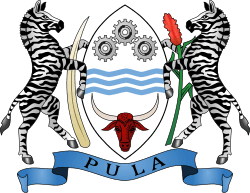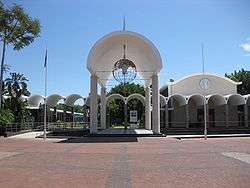Politics of Botswana
 |
| This article is part of a series on the politics and government of Botswana |
| Constitution |
|
Government |
|
Politics of Botswana takes place in a framework of a parliamentary representative democratic republic, whereby the President of Botswana is both head of state and head of government, and of a multi-party system. Executive power is exercised by the government. Legislative power is vested in both the government and the Parliament of Botswana. The party system has been dominated by the Botswana Democratic Party (BDP), which has never lost power since independence. The Judiciary is independent of the executive and the legislature.
Botswana is formally a multiparty constitutional democracy. Each of the elections since independence in September 1966 has been freely and fairly contested and has been held on schedule. The country's small white minority and other minorities participate freely in the political process. There are two main rival parties and a number of smaller parties. General elections are held at least every five years.[1]
Legislative branch
The National Assembly has 57 elected and 4 appointed members ; it is expanded following each census (every 10 years). After elections, the party that wins the majority elects the State President. The President then appoints the Vice President, but the appointment is subject to endorsement by the National Assembly.
There are 57 parliamentary constituencies in Botswana.[2]
The advisory House of Chiefs represents the eight principal subgroups of the Batswana people, and four other members are elected by the subchiefs of four of the districts. A draft of any National Assembly bill of tribal concern must be referred to the House of Chiefs for advisory opinion. Chiefs and other leaders preside over customary, traditional courts, though all persons have the right to request that their case be considered under the formal British-based legal system.
Current Cabinet
The President appoints Ministers to head the different government Ministries. The President and Ministers form the Cabinet (Executive). The Cabinet is headed by the President, who is also head of government.
| Office | Incumbent |
|---|---|
| President | H.E. Lieutenant General Dr Seretse Khama Ian Khama |
| Vice president | Mokgweetsi Masisi |
| Minister of Presidential Affairs and Public Administration | Eric Molale |
| Minister of Local Government | Slumber Tsogwane |
| Minister of Trade and Industry | Vincent Seretse |
| Minister of Finance and Development Planning | Kenneth Matambo |
| Minister of Youth, Sports and Culture | Thapelo Olopeng |
| Minister of Minerals, Energy and Water Resources | Kitso Mokaila |
| Minister of Infrastructure, Science and Technology | Nonofo Molefhi |
| Minister of Defence, Justice and Security | Shaw Kgathi |
| Minister of Agriculture | Christian De Graaf |
| Minister of Works and Transport | Tshenolo Mabeo |
| Minister of Labour and Home Affairs | Edwin Batshu |
| Minister of Health | Dorcus Makgatho |
| Minister of Foreign Affairs and International Cooperation | Pelonomi Venson-Moitoi |
| Minister of Environment, Wildlife and Tourism | Tshekedi Khama |
| Minister of Education and Skills Development | His Honour the Vice President Mokgweetsi Masisi |
| Minister of Lands and Housing | Prince Maele |
Source: [3] Accessed 14/01/2015
Local government
Local government is administered by nine district councils and five town councils. District commissioners have executive authority and are appointed by the central government and assisted by elected and nominated district councilors and district development committees. There has been ongoing debate about the political, social, and economic marginalization of the San (Bushmen). The government's policies for remote area dwellers continue to spark controversy and may be revised in response to domestic and donor concerns.
Political parties and elections
Judicial branch
The highest court of Botswana is the Court of Appeal, which is constituted under section 99 of the Constitution and consists of a President and such number of Justices of Appeal as may be prescribed by Parliament.[4] There are currently eight judges of the Court of Appeal, who are all expatriates drawn from different parts of the Commonwealth. To date, no Motswana has ever been appointed to the Court of Appeal.[5]
The High Court is a superior court of record with unlimited original jurisdiction to hear and determine any criminal and civil cases under any law. The High Court is constituted under section 95 of the Constitution, and consists of a Chief Justice and such number of other judges of the High Court as may be prescribed by Parliament.[4] There are currently sixteen permanent judges of the High Court. Until 1992, the judges of the High Court were expatriate judges who were appointed on short-term contracts of two to three years. In 1992 the first citizen judges were appointed to the bench. There are two High Court divisions in Lobatse and Francistown.[5]
There are also Magistrates' Courts in Botswana. These courts are subordinate to the High Court and hear a range of civil, criminal and family law matters. There are nineteen Magistrates' Courts in the country, with fifty magistrates of whom seventeen are expatriate.[5]
Judges are appointed by the president and may be removed only for cause and after a hearing.
Judgments of the Botswana Court of Appeal
Judgments of the Botswana High Court
International organization participation
ACP, AfDB, C, ECA, FAO, G-77, IAEA, IBRD, ICAO, ICCt, ICFTU, ICRM, IDA, IFAD, IFC, IFRCS, ILO, IMF, Interpol, IOC, ISO, ITU, NAM, OAU, OPCW, SACU, SADC, UN, UNCTAD, UNESCO, UNIDO, UPU, WCO, WFTU, WHO, WIPO, WMO, WTO, WT
See also
References
- ↑ Background Note: Botswana
- ↑ "Constituencies". Parliament of Botswana. Retrieved 2010-08-03.
- ↑ http://www.gov.bw/en/News/New-Cabinet-Ministers/
- 1 2 Constitution of Botswana
- 1 2 3 Republic of Botswana: The Hierarchy of the Courts
